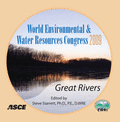GIS-Based Landscape Parameters for Wetland Evaluation Related to Amphibian Health
Publication: World Environmental and Water Resources Congress 2009: Great Rivers
Abstract
Infrastructure decisions for transportation include where to locate rights-of-way (ROWs) for new transportation routes. These new routes can impact wetlands by replacing them with roadways and by impacting the landscape that supports biodiversity within the wetland. State departments of transportation (DOTs) need guidance for how to evaluate alternative ROWs in light of the potential impact on wetlands. Because a wetland and the surrounding landscape are spatial in nature, they are well-suited to analysis via a geographic information system (GIS). Many landscape parameters can be devised and information layers developed. Meaningful information layers are those that describe the impact that the landscape has on the amphibian life cycle. An interdisciplinary research team from the University of Missouri and the Missouri Department of Transportation (MoDOT) brings the unique perspectives of civil engineering, geography and biological sciences to bear on this problem. At the "micro" scale, amphibian species and abundance have been sampled within 49 constructed wetlands in northern Missouri. These data has been analyzed from the biological perspective to create a habitat quality rating for each wetland, considering that some species are more sensitive to wetland changes, with their presence indicating a higher quality environment. This rating provides the dependent variable, y, for the creation of a regression equation relating landscape parameters to amphibian health, and thus wetland quality, at a "macro" scale. As a first step in developing a regression equation, appropriate GIS variables must be developed. Factors such as land cover, and the presence or absence of roads and streams have been identified as being important to amphibian health. However, one cannot simply utilize layers of land cover, because the important factor is how the amphibians interact with the landscape. This paper focuses on the effort to devise a set of GIS parameters that accurately represent amphibian interactions with the landscape. There are a number of important requirements for this amphibian-based GIS analysis. In addition, amphibians first encounter those landscape conditions that are closer to the wetland, so greater importance is associated with nearer features. Because migrating adult or dispersing juvenile amphibians may travel from a wetland in any direction, the analysis must be performed on landscape parameters that occur within discrete "quadrants" or portions of quadrants radiating out from a wetland. In addition, earlier encounters can impact how other features are evaluated, so the context and location of conditions is important, and features must be evaluated from inner to outer locations in a sequential fashion. For example, if an amphibian encounters an interstate highway that constitutes an absolute barrier, then a forested area on the other side of the road has no value because it cannot be used to benefit the amphibians. Lastly, a parameter such as access to water can induce both positive and negative impacts, and the GIS parameter must represent this duality. With appropriate GIS parameters, the regression equation can be developed and used to inform the selection of ROWs to avoid locations that provide important habitat for amphibians.
Get full access to this article
View all available purchase options and get full access to this chapter.
Information & Authors
Information
Published In
Copyright
© 2009 American Society of Civil Engineers.
History
Published online: Apr 26, 2012
ASCE Technical Topics:
- Analysis (by type)
- Barriers (by type)
- Engineering fundamentals
- Geographic information systems
- Geomatics
- Highway and road management
- Highway barriers
- Highway transportation
- Highways and roads
- Infrastructure
- Landscaping
- Mathematics
- Parameters (statistics)
- Protective structures
- Regression analysis
- River engineering
- River systems
- Route preferences
- Statistical analysis (by type)
- Statistics
- Structural engineering
- Structures (by type)
- Surveying methods
- Traffic engineering
- Transportation engineering
- Urban and regional development
- Urban areas
- Water and water resources
- Wetlands (fresh water)
Authors
Metrics & Citations
Metrics
Citations
Download citation
If you have the appropriate software installed, you can download article citation data to the citation manager of your choice. Simply select your manager software from the list below and click Download.
